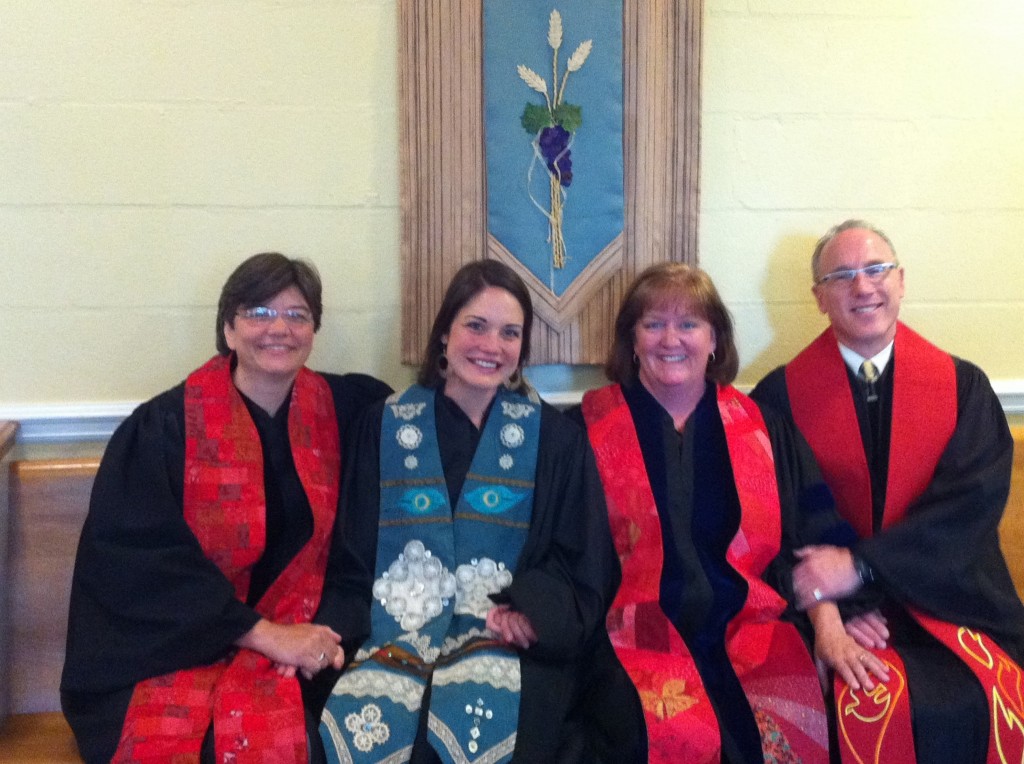This morning I attended an amazing and empowering service of ordination at Glendale Baptist Church where I am a member. We gave our blessings to The (newly minted) Reverend Claire McKeever-Burgett who has been one of our pastoral interns for two years.
Many things contribute to one’s preparation for ministry: calling, gifts, family and congregational partnership, good classroom learning, wise mentors, solid experiences of ministry and reflection on what happens there. Stretched across all these preparations is another sort of support in the form of good friends who are walking the same path.
Earlier this week, in my final week of teaching for the spring semester, I took a trip within a trip from St. Paul to Indianapolis. I attended a ten-year celebration of the Lilly Endowment’s Sustaining Pastoral Excellence (SPE) initiative. I was there as an invited guest of the Lilly Endowment for the sake of observing, learning and networking in support of the research project that I co-direct. The Learning Pastoral Imagination Project (LPI) is an ethnographic study of ministry that asks how pastoral imagination is formed through practice in ministry over time.
Pastors and project directors of the SPE projects are doing something we might call ministry development. They focus on supporting the work of ministry directly. In the LPI Project we are gathering and interviewing pastors mainly for the sake of articulating how they learn the practice of ministry and what the shape of that looks like over time. We have found that even getting a group of pastors together for one full day provides a kind of peer support that they long for. At the end of an interview day, we often find pastors saying, “Wow. That was an amazing day of being with other ministers and sharing stories. What a gift.”
The purpose of the large SPE gathering in Indianapolis was both to celebrate the work and to share key learnings from the last ten years through a variety of presentations, videos, table-top displays, workshops and conversations. And as a strategy of helping the 60+ SPE projects maintain their momentum or continue in new directions, the project directors each brought additional guests and stake holders from their organizations. It was a rich celebration of worship, story-sharing, food and music.
One of the key learnings of the SPE projects is that peer support is crucial for ministers to thrive. The idea is both fairly simple and straightforward, and also more challenging and complex that it might appear. Ministry can be isolating and lonely. It is a practice which demands attending to, caring for and leading for the spiritual, emotional and relational lives of parishioners.
Peer support is a tremendous gift to pastors for their work. Let me speak from my own experience. I didn’t always have a formal peer group, but while I was serving full time in a church I had several kinds of support with friends and colleagues. Chiefly the other pastors on the staff where I worked were a constant source for reflection and support. I also met with other small groups outside my church.
Sometimes we read books and got together to talk about them. Some of us went on retreats together. Other groups formed around shared ministry – like serving on boards of directors and denominational task groups. On all those occasions when I gathered with other ministers I savored the time and space to hear how others were making things work, and to share my own stories and find recognition and support. By recognition, I don’t mean I got a prize! I mean that my experiences, emotional responses, struggles and dreams for my vocation were recognized, acknowledged and affirmed by these friends and colleagues.
Besides all of that, we had a lot of fun. A lot of laughing. And some very fine meals. We could let our hair down, speak some of our deepest moments of honesty and not be on guard for fear of criticism or rebuke. Everyone needs spaces like these to nourish their work, especially if their work is relationships and community. For ministers who deal in humanity’s profound moments of celebration, grief, faith, illness, birth, death and the daily and weekly rounds of caring for the souls of their community, time apart for care and nurture of one’s own soul is essential.
Make this space doesn’t happen automatically or without effort. Many of the SPE projects have found that a trained facilitator is crucial for the groups to function well. Others learned that establishing the task or purpose was necessary to prevent the time being chewed up by laments or complaining. Making space that is consistent and nourishes souls takes intention and care. Lots of creative strategies for shaping that space have been learned by the thousands of participants in SPE sponsored peer groups.
As I think of Claire and dozens of others I know who are graduating, receiving ordination and beginning new places of ministry this season, it is my prayer that God’s spirit will guide them and hold them in these new beginnings. And I pray that they will find courage to look steadily and lovingly into the faces of those they serve and also into the faces of friends who will support and love them beyond measure. For in each of these faces they will see the face of God.




